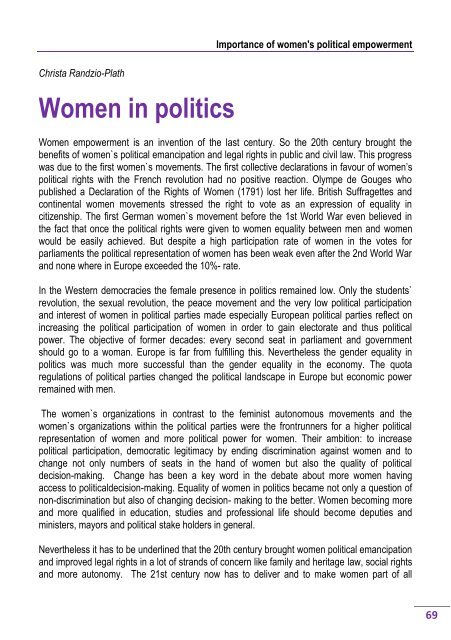Importance of women's political empowerement - Gurmai Zita
Importance of women's political empowerement - Gurmai Zita
Importance of women's political empowerement - Gurmai Zita
You also want an ePaper? Increase the reach of your titles
YUMPU automatically turns print PDFs into web optimized ePapers that Google loves.
Christa Randzio-Plath<br />
Women in politics<br />
<strong>Importance</strong> <strong>of</strong> <strong>women's</strong> <strong>political</strong> empowerment<br />
Women empowerment is an invention <strong>of</strong> the last century. So the 20th century brought the<br />
benefits <strong>of</strong> women`s <strong>political</strong> emancipation and legal rights in public and civil law. This progress<br />
was due to the first women`s movements. The first collective declarations in favour <strong>of</strong> women’s<br />
<strong>political</strong> rights with the French revolution had no positive reaction. Olympe de Gouges who<br />
published a Declaration <strong>of</strong> the Rights <strong>of</strong> Women (1791) lost her life. British Suffragettes and<br />
continental women movements stressed the right to vote as an expression <strong>of</strong> equality in<br />
citizenship. The first German women`s movement before the 1st World War even believed in<br />
the fact that once the <strong>political</strong> rights were given to women equality between men and women<br />
would be easily achieved. But despite a high participation rate <strong>of</strong> women in the votes for<br />
parliaments the <strong>political</strong> representation <strong>of</strong> women has been weak even after the 2nd World War<br />
and none where in Europe exceeded the 10%- rate.<br />
In the Western democracies the female presence in politics remained low. Only the students`<br />
revolution, the sexual revolution, the peace movement and the very low <strong>political</strong> participation<br />
and interest <strong>of</strong> women in <strong>political</strong> parties made especially European <strong>political</strong> parties reflect on<br />
increasing the <strong>political</strong> participation <strong>of</strong> women in order to gain electorate and thus <strong>political</strong><br />
power. The objective <strong>of</strong> former decades: every second seat in parliament and government<br />
should go to a woman. Europe is far from fulfilling this. Nevertheless the gender equality in<br />
politics was much more successful than the gender equality in the economy. The quota<br />
regulations <strong>of</strong> <strong>political</strong> parties changed the <strong>political</strong> landscape in Europe but economic power<br />
remained with men.<br />
The women`s organizations in contrast to the feminist autonomous movements and the<br />
women`s organizations within the <strong>political</strong> parties were the frontrunners for a higher <strong>political</strong><br />
representation <strong>of</strong> women and more <strong>political</strong> power for women. Their ambition: to increase<br />
<strong>political</strong> participation, democratic legitimacy by ending discrimination against women and to<br />
change not only numbers <strong>of</strong> seats in the hand <strong>of</strong> women but also the quality <strong>of</strong> <strong>political</strong><br />
decision-making. Change has been a key word in the debate about more women having<br />
access to <strong>political</strong>decision-making. Equality <strong>of</strong> women in politics became not only a question <strong>of</strong><br />
non-discrimination but also <strong>of</strong> changing decision- making to the better. Women becoming more<br />
and more qualified in education, studies and pr<strong>of</strong>essional life should become deputies and<br />
ministers, mayors and <strong>political</strong> stake holders in general.<br />
Nevertheless it has to be underlined that the 20th century brought women <strong>political</strong> emancipation<br />
and improved legal rights in a lot <strong>of</strong> strands <strong>of</strong> concern like family and heritage law, social rights<br />
and more autonomy. The 21st century now has to deliver and to make women part <strong>of</strong> all<br />
69



